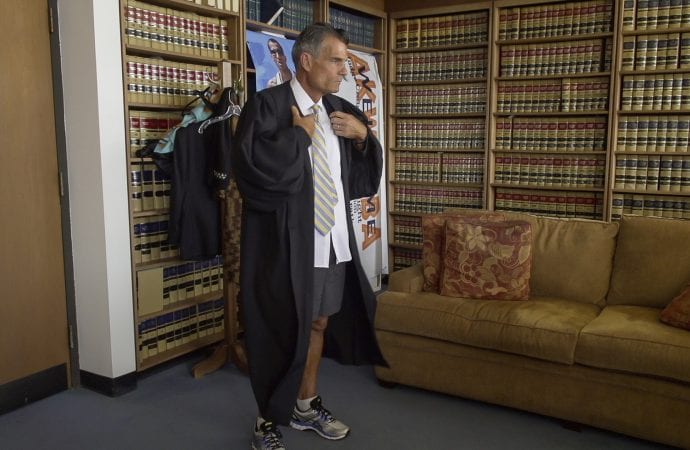For Craig Mitchell, a pair of running shoes has become just as much a part of his professional gear as his judge’s robe.
Mitchell, a superior court judge in Los Angeles, may be known for spending his days behind the bench, but is dedicating most of his free time these days to hitting the notoriously rough streets of Skid Row, running alongside the city’s homeless population in hopes of spurring them toward a brighter future.
As a Catholic, Mitchell says that his faith is part of the motivation for his efforts, citing Christ’s words that “what you did not do for one of these least ones, you did not do for me.”
“One of the things that keeps me Catholic,” he told Crux in a recent interview, “is the emphasis the Church has not just on knowing your scripture or just going to church, but walking the walk.”
Or, in his case, running the race.
In 2012, Mitchell started a running club after a man he’d previously sentenced returned to thank him for “treating me like a human being.”
The individual was on parole at the Midnight Mission, a social services organization in the heart of L.A.’s Skid Row, and, after seeing the effect of just one person being treated like a human being, Mitchell thought he might be able to have the same influence on others.
The result: The Skid Row Running Club, which brought together a mix of homeless individuals, off duty law enforcement officials, and other individuals in recovery - all with the hope of uniting together to better their health, relationships, and to provide a regular source of stability and purpose in their lives.
At age 62, Mitchell has completed marathons in Africa, Asia, and the Middle East - not to mention his own country - and is now helping others do the same.
Two days a week he rises long before the sun is out and heads to Skid Row where he joins anywhere from 30 to 50 other runners, many of whom are homeless, for a trek around the city. On Saturdays, he’s back at it, joining in the training for long distance runs. In total, he estimates that over 300 individuals have joined him in his early morning runs.
For Mitchell, homeless individuals may feel a certain societal stigma, but once they hit the streets running, an egalitarian spirit kicks in, serving as a healthy reminder that they’re all in it together - and one that he hopes will not only lift their spirits, but also shift public perceptions.
“The general public has a one dimensional view of what it means to be homeless,” he says, noting that most people are only shaped by the images on television of people pushing shopping carts or living in tents.
“The depth that any human being possesses innately is very much alive, well and present even if you’re homeless or addicted or recovering from addiction,” Mitchell says, resisting the stereotypes or caricatures that he believes are far too common when it comes to the homeless.
Homeless individuals are “real people with the same aspirations and goals as everyone,” he insists.
Mitchell told Crux that he takes inspiration from Pope Francis who has made a “culture of encounter” a focus of his papacy - while adding that despite his “great respect and affinity” for the pope, “he has a very unwieldy church to try and deal with.”
“There are factions within the Church that are opposed to the emphasis that he has placed on the marginalized, and I just hope they come to see that in his heart, that commitment is extremely genuine.”
“I wish the forces that are resistant would understand that his commitment is consistent with what we know about Jesus,” says Mitchell.
In the same spirit that Jesus spent the bulk of his time among the outcasts and the downtrodden, Mitchell says he hopes that his presence is a reminder of what matters most.
In fact, on October 14, a new documentary - Skid Row Marathon - was released chronicling his efforts, serving as a modern parable of sorts sharing the good news of his work and inspiring others to consider ways in which they might see the homeless in a new light.
“Every week we get new runners,” says Mitchell. “What keeps me waking up at 2:30 a.m. is the knowledge that we get new people who are trying to rebuild their lives. The support and the guidance of our program is vital to each one of them.”

